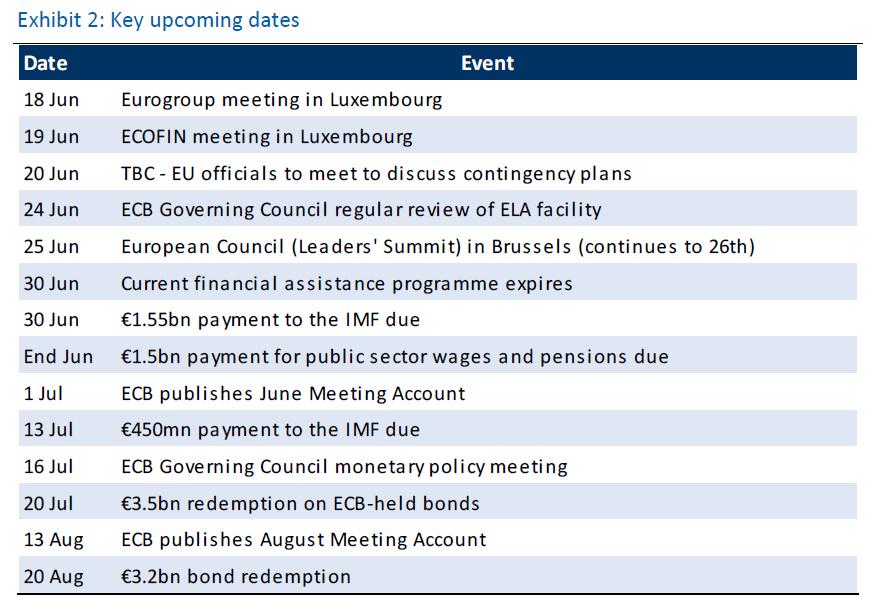 Greece’s international creditors are aiming to strike a deal to stop Athens defaulting on its debt and possibly tumbling out of the euro by extending its bailout by six months and supplying up to €18bn (£12.9bn) in rescue funds. The Brussels-based negotiating team are also proposing to pledge debt relief for the austerity-battered country – but officials stressed that a breakthrough hinged on a positive response from the Greek prime minister, Alexis Tsipras. Negotiations were continuing on Sunday night, hours ahead of crucial gatherings of eurozone finance minsters and leaders in Brussels, which Angela Merkel, the German chancellor, François Hollande, the French president, and Tsipras are expected to attend. All three leaders spoke over the weekend, with contributions from European commission head Jean-Claude Juncker. The crisis meeting was convened in an attempt to ease Greece’s debt crisis before a critical €1.6bn payment to the International Monetary Fund falls due next Tuesday.
Greece’s international creditors are aiming to strike a deal to stop Athens defaulting on its debt and possibly tumbling out of the euro by extending its bailout by six months and supplying up to €18bn (£12.9bn) in rescue funds. The Brussels-based negotiating team are also proposing to pledge debt relief for the austerity-battered country – but officials stressed that a breakthrough hinged on a positive response from the Greek prime minister, Alexis Tsipras. Negotiations were continuing on Sunday night, hours ahead of crucial gatherings of eurozone finance minsters and leaders in Brussels, which Angela Merkel, the German chancellor, François Hollande, the French president, and Tsipras are expected to attend. All three leaders spoke over the weekend, with contributions from European commission head Jean-Claude Juncker. The crisis meeting was convened in an attempt to ease Greece’s debt crisis before a critical €1.6bn payment to the International Monetary Fund falls due next Tuesday.
Reuters reported on Sunday that €1bn worth of withdrawal orders had been lodged with Greek banks over the weekend – on top of the €4bn that left the country’s banking system last week. The news agency also said that the European Central Bank was set to discuss extending financial help to the banks this morning, amid fears that Greek banks would be unable to open on Tuesday.
A hectic round of telephone diplomacy took place over the weekend between leaders in Athens, Berlin, Paris and Brussels while technocrats on both sides sought to hammer out the small print of the fiscal arithmetic forming the basis for a last-minute agreement days before Greece’s existing bailout expires. With time running out, the only way an IMF default could now be avoided is for the ECB to raise the ceiling on the short-term debt Athens is allowed to sell, the officials said. This would need to happen by Monday next week. Brussels sources also signaled moves to address Tsipras’s key demand – that the creditors need to offer debt relief to Greece. Some form of debt restructuring would be promised to Athens in the future, but it would come with strings attached and not as part of the current bailout package, they said. Yanis Varoufakis, the outspoken Greek finance minister, said on Sunday that Greece’s fate hinged on Merkel, and told her she faced a stark decision. But his spokesman reacted sceptically to suggestions of creditor promises on eventual debt relief, describing the eurozone as “pathological liars”.
 The Greek government has rejected a proposed five-month extension of the country’s bailout accord, Helena Smith reports from Athens. Greek officials have turned down the deal. “The text that was given to the Greek side is worse than the memorandum,” one was quoted as saying by the Athens news agency. Government sources have lashed out at the “unacceptable” tactics employed by interlocutors representing foreign lenders at the EU, ECB and IMF. There are reports, says Helena, that prime minister Alexis Tsipras is making a speedy return to Athens....Donald Tusk and Jean-Claude Juncker have finally held their press conference. Here are the main points: European council head Tusk said there are three days left to strike a deal with Greece, and we are very close to the day when the game is over. Both struck a conciliatory tone, responding to earlier comments by Tsipras who accused creditors of “blackmail and ultimatums”. European Commission president Juncker denied that the eurozone had issued an ultimatum to Greece.
The Greek government has rejected a proposed five-month extension of the country’s bailout accord, Helena Smith reports from Athens. Greek officials have turned down the deal. “The text that was given to the Greek side is worse than the memorandum,” one was quoted as saying by the Athens news agency. Government sources have lashed out at the “unacceptable” tactics employed by interlocutors representing foreign lenders at the EU, ECB and IMF. There are reports, says Helena, that prime minister Alexis Tsipras is making a speedy return to Athens....Donald Tusk and Jean-Claude Juncker have finally held their press conference. Here are the main points: European council head Tusk said there are three days left to strike a deal with Greece, and we are very close to the day when the game is over. Both struck a conciliatory tone, responding to earlier comments by Tsipras who accused creditors of “blackmail and ultimatums”. European Commission president Juncker denied that the eurozone had issued an ultimatum to Greece.





